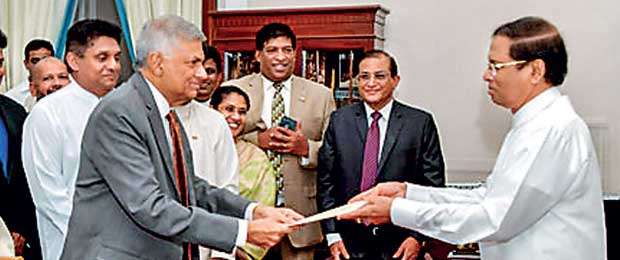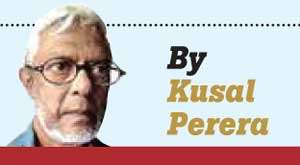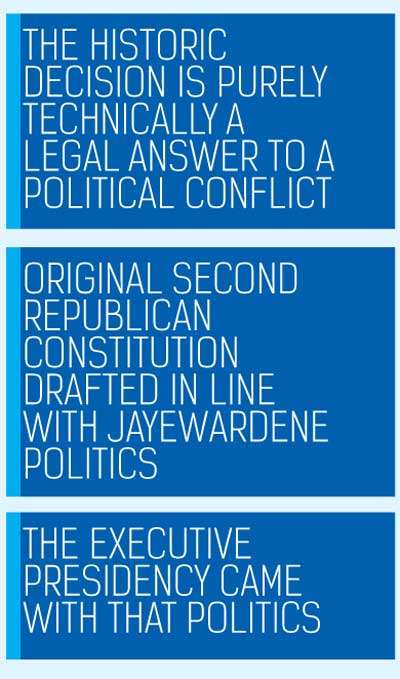Reply To:
Name - Reply Comment
Last Updated : 2024-05-08 00:01:00
Constitutions do carry with them the politics of their drafting masters
It’s democracy that’s used to KILL democracy

Democracy was the most cherished word during the past 50 plus days, along with the Constitution.
Reference to Constitutionality in every sense was important for Parliamentary proceedings to be conducted as usual. Thus democracy, the constitution and constitutionality of decisions made and steps were taken became important with Friday, October 26, Presidential decisions.
We were told through mainstream and social media and with protests in Colombo that we had to get back to democracy with Parliament functioning at whatever cost. The democracy we were told was about getting back to the pre-October 26 status quo.
It was this status quo all Fundamental Rights (FR) petitions to the Supreme Court prayed for. They prayed that the November 09 Gazette dissolving Parliament be ruled as null and void.
All arguments were “based on the analysis of the nature, effect and meaning of Articles 33 (2) (c), 62 (2) and 70” as the SC ruling says, with 70(1) included.
It was thus about President‘s powers in Article 33 (2) that includes and specifies the power vested in the President to summon, prorogue and dissolve Parliament”, but cannot be read outside the limitations laid down in Article 70(1).
The SC ruling explains:
“By operation of the second paragraph of Article 70(1), the President cannot dissolve Parliament during the first four and a half years of its term unless he has been requested to do so by a resolution passed by not less than two thirds of the Members of Parliament [including those not present].”
The Gazette dissolving Parliament and fixing parliamentary elections for 05 January 2019 was thus unanimously declared null and void.
The SC argued only on provisions that were written into the Constitution. They paid attention to Fundamental Rights enshrined under Article 14 of the Constitution but were not expected to politically read the conflict.
What is hailed as an historic decision, is purely and technically a legal answer to the conflict, which in essence is a political conflict.
Politically, the conflict remains unresolved. Constitutions do carry with them the politics of its drafting masters.
The original Second Republican Constitution was drafted to be in line with Jayewardene Politics the UNP continues with.
The yet to be abolished Executive Presidency came with that politics.
Almost all Amendments to the Constitution came with ruling party politics.
The 04th Amendment required a People’s Referendum after a two-thirds majority in Parliament, as it sought to postpone Parliamentary Elections till 04 August 1989.
Jayewardene manipulated the Referendum as well.
It was Sinhala Buddhist racist politics of Jayewardene’s UNP Government that brought the 06th Amendment after the 1983 July massacre of Tamil people, which compelled TULF MPs to leave Parliament after August 1983.
It is also the 06th Amendment that is used in indicting MP Maheswaran over her statement about the LTTE.
12th Amendment was never enacted, also for political reasons.
The 14th Amendment was that which increased the Parliament from 168 to 225 MPs including a National List, that promised to have eminent personalities from different disciplines in Parliament.
"That leaves Sri Lanka without any serious alternatives discussed and people’s democracy strangled all along with Colombo middle class calls for democracy that does not mean anything to people’s lives."
The 18th Amendment not only scrapped the term limits of Presidency but also brought all Independent Commissions under the President’s influence and allowed the President to attend Parliament and take part in its business with all powers and privileges of an MP except the right to vote.
The Parliament thus came to be manipulated by the Executive power, not the other way round.
This 18th Amendment was allowed without a People’s Referendum by the SC bench chaired by Chief Justice Shiranee Bandaranayake.
Most other amendments were necessary to follow up pieces of law.
One or two like the 17A were due to longtime lobbying and social pressure.
Fundamentally, these amendments did not necessarily meet People’s demands, requirements and aspirations. They necessarily met the political necessities of ruling party leaders.
Next was the (in)famous 19th Amendment.
 All through the year 2014, the 19A was campaigned for by the Venerable Sobitha Thera and his group of supporters to abolish the Executive Presidency, explained as the root cause of all ills; mega corruption, nepotism, autocratic rule and everything else there should not be. The first compromise came with accepting a Common Candidate Sobitha Thera wanted to abolish the Executive Presidency and the Common Candidate the UNP wanted to defeat President Rajapaksa, as one and the same.
All through the year 2014, the 19A was campaigned for by the Venerable Sobitha Thera and his group of supporters to abolish the Executive Presidency, explained as the root cause of all ills; mega corruption, nepotism, autocratic rule and everything else there should not be. The first compromise came with accepting a Common Candidate Sobitha Thera wanted to abolish the Executive Presidency and the Common Candidate the UNP wanted to defeat President Rajapaksa, as one and the same.
That compromise was written into Common Candidate Sirisena’s election manifesto as:
“The new Constitutional structure would be essentially an Executive allied with the Parliament through the Cabinet instead of the present autocratic Executive Presidential System.” (Page 14)
The manifesto also said:
“I will not touch any Constitutional Article that could be changed only with the approval at a Referendum.” (ibid)Defeating Rajapaksa also required a Government that could stay put for a full term.
It meant the UNP Government with Wickremesinghe as PM installed in 2015 January as the smallest Minority Government in Parliamentary history with just 20 per cent of the MPs had to continue in power.
The required majority for the UNP Government was created on the strength of the new President voted in on UNP and minority votes.
His power to dole out Ministerial portfolios to MPs who actually opposed him at the Presidential elections and represented the party he defected from
to contest against Rajapaksa, held sway.
Collecting the majority for the 100-Day UNP rule, was a crude horse deal the Colombo social activists and the Anti-Rajapaksa lobby accepted with applause as democratic and Constitutional.
True to the election manifesto, there was no abolishing of the Executive Presidency. The leadership of the ruling UNP Government drafted and adopted it the way they wanted. There was no Referendum too.
People were no party to the 19A.
As stressed in these pages many times before, 19A was rushed through with no proper debate and with clauses included at the will of the UNP leadership.
It violated Article 23(1) of the Constitution that says: “All laws and subordinate legislation shall be enacted or made and published in Sinhala and Tamil, together with a translation thereof in English”.
Democracy was when Tamil MP Praba Ganesan was shouted down by PM Wickremesinghe for requesting a Tamil copy of a clause hurriedly introduced.
He was asked to use the English Copy. There were no Sampanthans or Sumanthirans to demand Tamil copies as a Constitutional Right and no JVP, JHU to demand Sinhala copies.
Speaker Chamal Rajapaksa too allowed its passage without insisting draft copies in all three languages.
The 19th Amendment the Colombo middle-class social activists embrace with pride was written into the Constitution in the most undemocratic, unconstitutional and in a fiercely dictatorial manner.
The UNP Government now continues for four and a half years, on the strength of Article 70(1) that does not allow dissolution of Parliament even if the Budget is defeated and a No Confidence Motion goes through.
That’s not all in 19A. It also allows ghost alliances as National Governments to be propped up to provide ministerial portfolios for MPs bought through horse deals though everyone was shouting hoarse against such horse deals after
October 26.
Once in the Constitution, 19A has to be respected for the sake of Democracy, irrespective of what politics there is. That is precisely why the crisis is yet not over.
That is why a stable Government is not possible and that is also why most nauseating and stinking proposals are made to include the worst corrupt in Cabinet portfolios and for cobbling up hilarious National Governments.
Proposals are made once again to install a national Government with the only SLMC MP in Parliament, who is neither the leader of the party nor its Secretary General. Even if it is dropped, it is yet crude politics of 19A that allows the Constitution to accept such hideous Governments on a resolution adopted in Parliament by a simple majority.
This is not condemned and opposed by urban middle-class saviours of democracy. Constitutional provisions adopted in the most undemocratic and unparliamentary manner written that way to allow deals and crossovers are democratic too when it suits the urban social activists and their funders.
Thus there is no loud opposition to Karunanayake who had to resign on the CBSL bond scam issue, coming back to the Cabinet either by these funded voices.
Bottom line is, all things undemocratic, corrupt and arrogantly autocratic are accepted and tolerated to showcase as saving democracy to keep Rajapaksa out.
That leaves the TNA discredited and condemned among the Northern Tamil polity, with all its promises to have a new Constitution before 31 December 2016 nowhere in the horizon and all daily issues of the ordinary Tamil People left completely ignored by the ITAK leadership.
The conflict that broke into the open on Friday, October 26 night gets dragged on, giving Rajapaksa yet another racist platform with a call to save the Sinhala Buddhist Unitary State.
That leaves Sri Lanka without any serious alternatives discussed and people’s democracy strangled all along with Colombo middle class calls for democracy that does not mean anything to people’s life.

Add comment
Comments will be edited (grammar, spelling and slang) and authorized at the discretion of Daily Mirror online. The website also has the right not to publish selected comments.
Reply To:
Name - Reply Comment
US authorities are currently reviewing the manifest of every cargo aboard MV
On March 26, a couple arriving from Thailand was arrested with 88 live animal
According to villagers from Naula-Moragolla out of 105 families 80 can afford
Is the situation in Sri Lanka so grim that locals harbour hope that they coul
07 May 2024 - 2 - 1336
06 May 2024 - 3 - 1205